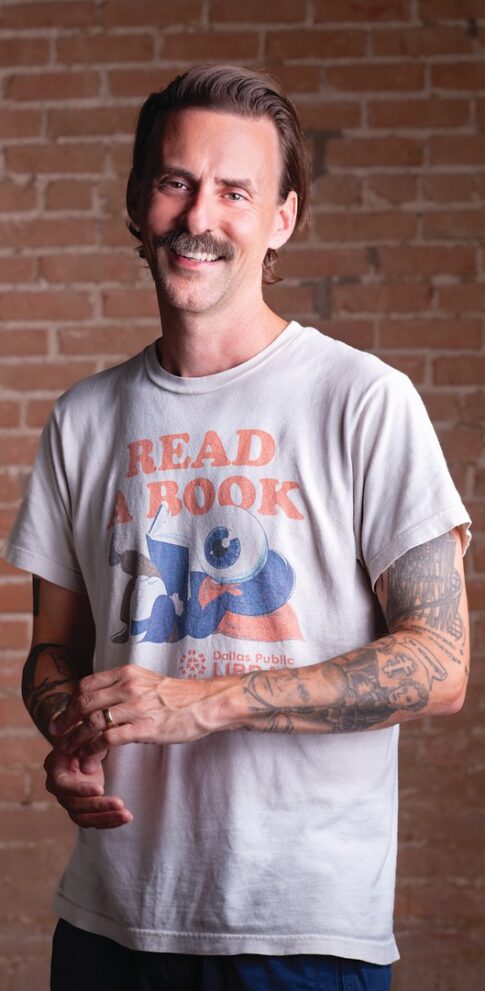Photo Credit: Breonny Lee
BY Taylor Adams Cogan
Will Evans persisted through teasing when he started calling Dallas a literary city in 2013. But he stuck with it for more than a decade because he knew it was true: Dallas has always had storytellers and people ready to read what they had to say.
Today, you find fewer people rolling their eyes when they hear that term, as Dallas gains recognition for its literary prominence. And when that discussion comes up so does Evans, as his Deep Vellum Publishing and the sister bookstore are nationally known for their work. But as Deep Vellum is also one of the country’s largest publishers of translated literature, it’s also known across the globe. Evans himself was knighted by France for his work in spreading French literature.
And all of these accomplishments come out of one Dallas neighborhood.
“Deep Ellum has a well-earned reputation of being the nightlife capital of Dallas. When you focus on that, you lose sight of the rest of the 24-hours cycle,” Evans says. “There’s a vibrant book culture that has existed in Deep Ellum.”
Catch Evans sporting a bolo tie, hear him talk about the history of our state, or understand his love of the city, and you might take him for a Texas native. (We’ll somewhat shy away from going into what makes a person a true Texan in this story – but you could say he’s become one.) Evans has made Dallas home – after he made his way from North Carolina, his home state and where he studied Russian arts and culture at Duke University.
“I was asking the big questions about art and how art can, should, and does change the world, and so I had struck up this notion of starting a publication house that specialized in international literature,” he says. “And then my wife got a job in Dallas.”
From afar, he says, he considered that it might not be what one would call the most well-read cities at the time. He got here and realized it was simply that people weren’t looking at it that way.
“I saw that as a chance to do something, be part of a change,” he says. “I saw a ton of great institutions, stories and storytellers, so that is how Deep Vellum was born.”
Evans started the nonprofit, independent publishing house in 2013 on Commerce Street, where two years later, we’d see its bookstore blossom on the corner at Walton Street.
The name is an homage to the neighborhood, he says, with Deep Ellum attracting the diverse residents and visitors it has since its founding and it proving to be a rich ground for creatives to develop a cultural history. As for the extra consonant, “vellum” is a thick parchment in high-quality printing.
“From Day 1, Deep Vellum was founded on wanting to contribute to the story of the city, as it’s being written in real time – both as a city and as a crossword. The whole world comes here,” he says.
The bookstore filled a gap in the retail fabric of Deep Ellum, but the concept wasn’t brand new for it, Evans says, noting that Larry McMurtry learned to be a bookseller in the neighborhood and – with no surprise since these streets were industrial – there was a book printer.
“When I moved there, the neighborhood was going through a sort of a rebirth: The retail life was really important,” he says. “When I looked at the neighborhood, I saw what a lot of American neighborhoods lacked, a true retail center, and bookstores are a really important part of that.”
Their role is integral not just because of the goods they allow people to purchase, but they’re that critical third place where people can go and build true community, Evans says.
A simple wooden sandwich board welcomes passersby with a chalk-written greeting, possibly displaying a literary quote, reminding people the power of art, or telling them to just try reading. The green-painted brick of the two-story, 1940 building sits comfortably in the historic aesthetic of the neighborhood. Shop windows bookend the simple front door that opens into the small bookstore densely filled with books from around the world translated to English, stories written by local authors, and novels that may just change your perspective on life.
“We greet everyone off the street the same. It’s a neighborhood that attracts a diverse customer base, in every sense of the word,” Evans says. “We don’t take for granted where they come from. As a literary nonprofit, we’re a unique place – we don’t ever talk down to anyone in the bookstore. They can engage with literature.
“That is unique: to think that everyone is up at the high level using literature. The bookstore is a way to unite the neighborhood.”
Evans chose Deep Ellum because that’s where Dallas’ cultural history lies, he says, including its literary history. You’ll find some of that on the bookshelves of the bookstore, finding books about the city at large and the history of the now-entertainment district. There’s a good chance manager Riley Rennhack will be there to help guide you to find what you’re looking for or share what novels she loves lately. (Editorial note: Listen. She has excellent taste.)
Deep Vellum has expanded its square footage so staff of the publishing house and bookstore can come together. They can also host more workshops and classes to invite people into writing and publishing – the bookstore’s had more than 750 events since opening as of 2024, and that’s with two years off thanks to the pandemic.
Evans has been credited for defining Dallas a literary city – an act that’s important and can shift people’s perspectives. But, he says, he didn’t make the city literary.
“Dallas was literary before I got here,” he says. “What a literary city is is the collective story – it’s the reader and the writer coming together. And we’re all storytellers.”
Thankfully we’re past the point of people laughing Evans out of a room when he praises our city and neighborhood for being literature-rich.
“It’s most important to remember that there was a long literary history in Deep Ellum. It was more of a renaissance, a different kind of appreciation for what we are and what we’ve had,” he says. “Now, we continue to expand, make it a city that’s better for writers, better for readers. That’s what comes next.”

